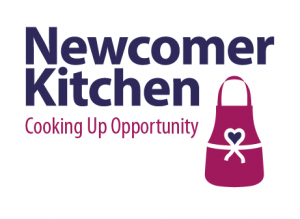TABLE TALK: Vanessa Yu
For an aspiring caterer to do well in an industry cornered by large food service providers is more daunting than most realize. Perhaps this isn’t news to you.
When Vanessa Ling Yu from caterToronto joined us at the Dep for a Table Talk, it certainly wasn’t news to me and others what she wanted to talk about: the barriers and opportunities for new entrepreneurs to work together in building more viable food businesses and stronger community food systems. Vanessa, with two masters in Health Sciences – Health Promotion and Social Science – Anthropology, has spent the last two years engaging a range of stakeholders in solutions in her work with caterToronto. She starts with an assets-based approach and views it as generally positive that most of us are thinking about our roles and relationships to the food system. “Little and big food groups and their milestones are laudable, no doubt. And yet, across the broad movement, it’s not difficult to see that participation and outcomes are stratified.”
Vanessa continues:
“Education and awareness is but one important part of growing an appreciative audience. Long and strong barriers stand in the way for specific socio-demographic groups – Aboriginal, women, newcomers, youth, and seniors, people of colour…The same sub-populations dealing with food insecurity are also those for whom a wide range of additional interlinked requisites to health are out of reach. Or rather, systematically more challenging to access due to stigma and discrimination.”
She provides an example: new immigrants and others have difficulty securing dignified, life-supporting jobs despite existing credentials and experience. Free programming for safe food handling tied to job search support is offered in neighbourhoods where costs may be prohibitive. But even after lessons are learned, the income-related prospects seem to flow directly out of the hands it seeks to develop, perpetuating a chain of ignored opportunities to promote better food jobs and businesses. People are working two to three jobs that are far from their homes, and far from a direct path towards dignity. The food industry is notoriously worse south of the border with its revolving door, but Vanessa says we have much to improve here too.
Again, starting with assets, Vanessa speaks of a future where Toronto has the best of food traditions from around the world, because we appreciate the value of food and people together. Taking a step back from the glossies, she works dynamically with caterers, community organizations, and businesses to build capacities and circumvent barriers to growth. They’ve been piloting out of a production kitchen for the last nine months and developing mutually beneficial partnerships towards social and economic outcomes. This year, with the support of Metcalf Foundation’s Inclusive Local Economies program funding, Vanessa will engage six additional Toronto neighbourhood organizations and caterers to expand caterToronto.
For Vanessa, “catering” refers to off-site food businesses including pop-ups, farmers’ and crafts markets, special events at corporate and community venues, as well as wholesale and retail products. She notes few resources exist for such off-site food businesses. Supposing a new food business manages to find an affordable kitchen and navigate start-up costs, Vanessa points out that many new food entrepreneurs do not consider auxiliary costs like insurance, labour, and revenue cycles… in short, the requisite business skills required to stay afloat. This is compounded with another problem that almost always goes unnoticed or even encouraged by consumers unless otherwise informed: race-to-the-bottom competitive pricing, especially in racialized food.
Vanessa illustrates this point with an example she says isn’t perfect but can help us understand the additional barriers faced by food that tends to be categorized as “ethnic food”:
“If you take dough, fry it and add sugar/salt, how much do you think you can sell it for?” she asks. If you’re a coffee chain and you do it on mass scale, you sell your donuts for about a buck. If you’re selling beignets, and you specialize in serving mimosas with your brunch, you can sell it upwards of $7. If you’re trying to sell mahamri, you’d be doing it for much less and wouldn’t have the marketing budget to inform the many who are not even familiar with these Swahili donuts (including myself). The list goes on.. (others likes loukoumades or churros or beaver tails… were not mentioned). Vanessa says there are many contributing reasons for what at first glance may appear to be undervalued or overpriced food. After all, we’re in this to grow small local food businesses, she says, and therefore resources and regulations must support growth in a sustainable fashion, rather than divide us. “The BIG food businesses providing unsafe, low-wage, deskilling jobs are the competition. Among us, we need to collaborate.” The idea is that your donut or taco or coffee might be worth a lot more or less depending on long standing perceptions of value that split community-based efforts for profit with larger corporations.
Maybe this isn’t a huge deal. But for Vanessa and her roster of caterers, it’s a matter of their livelihood.
So what can be done?
[youtube http://www.youtube.com/watch?v=4wmOeXRji_0?feature=player_embedded&w=640&h=360]
Part of the response by caterToronto is to develop and advise new caterers, co-develop products, menus, and pricing as well as offer workshops and training, wholesale equipment and ingredients at group rates. Vanessa confesses she never intended to manage catering orders, wanting to focus more on advocating for food justice (which she does through another initiative called Food Forward). But when the orders came in, it only made sense that she link clients with caterers too.
In the end, I got the sense that her efforts were about democratizing an industry currently catering to large food service providers.

